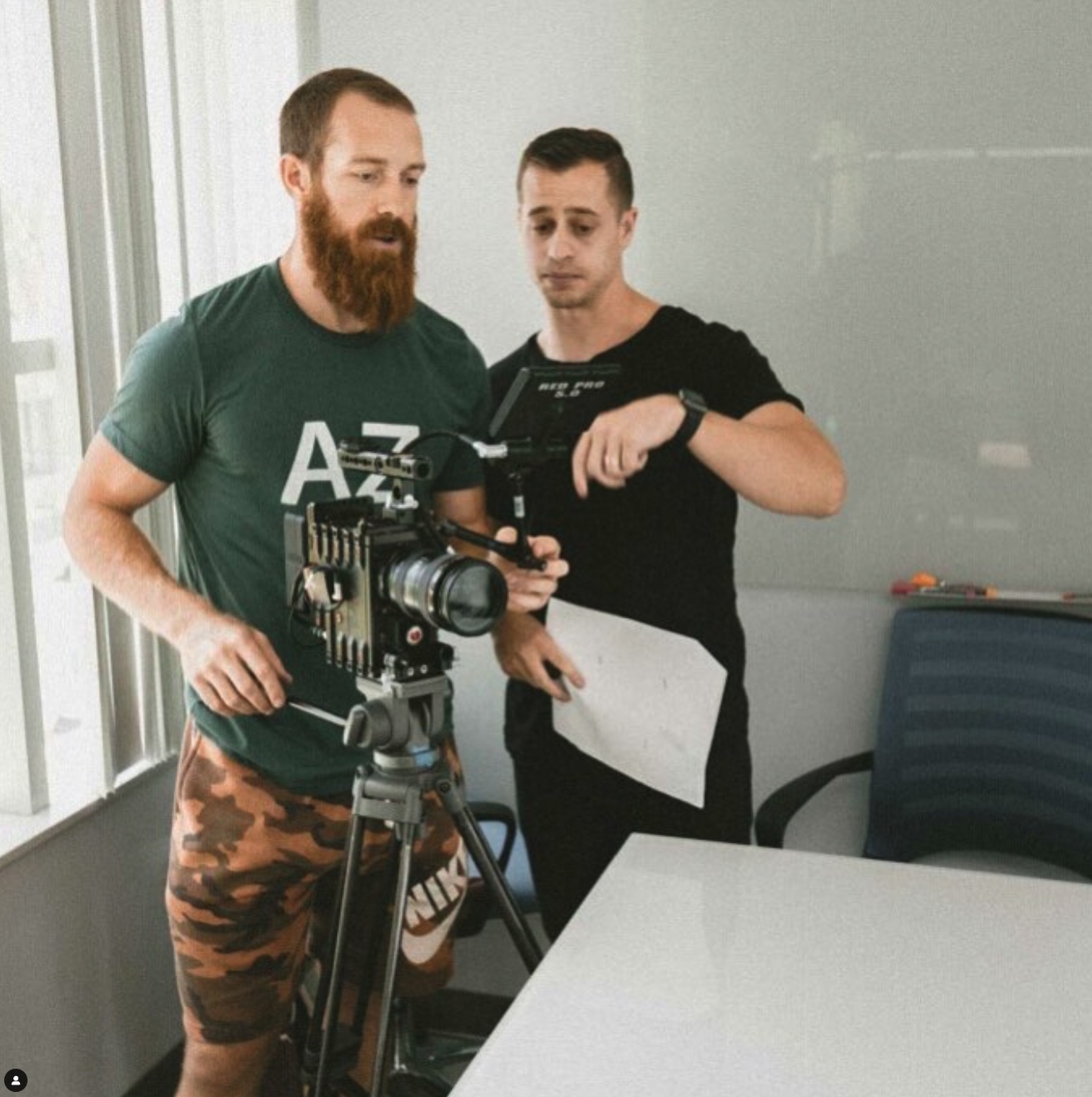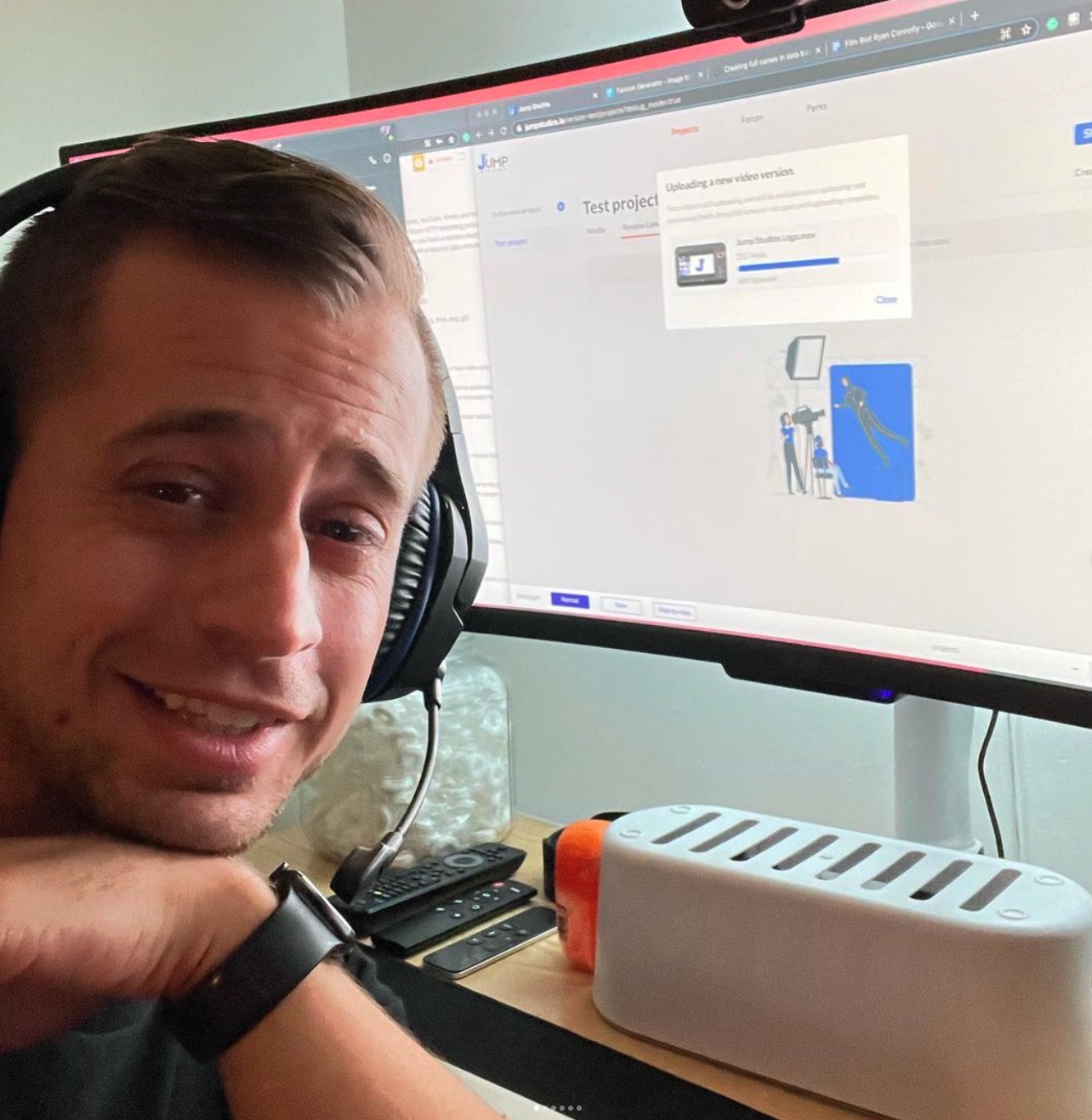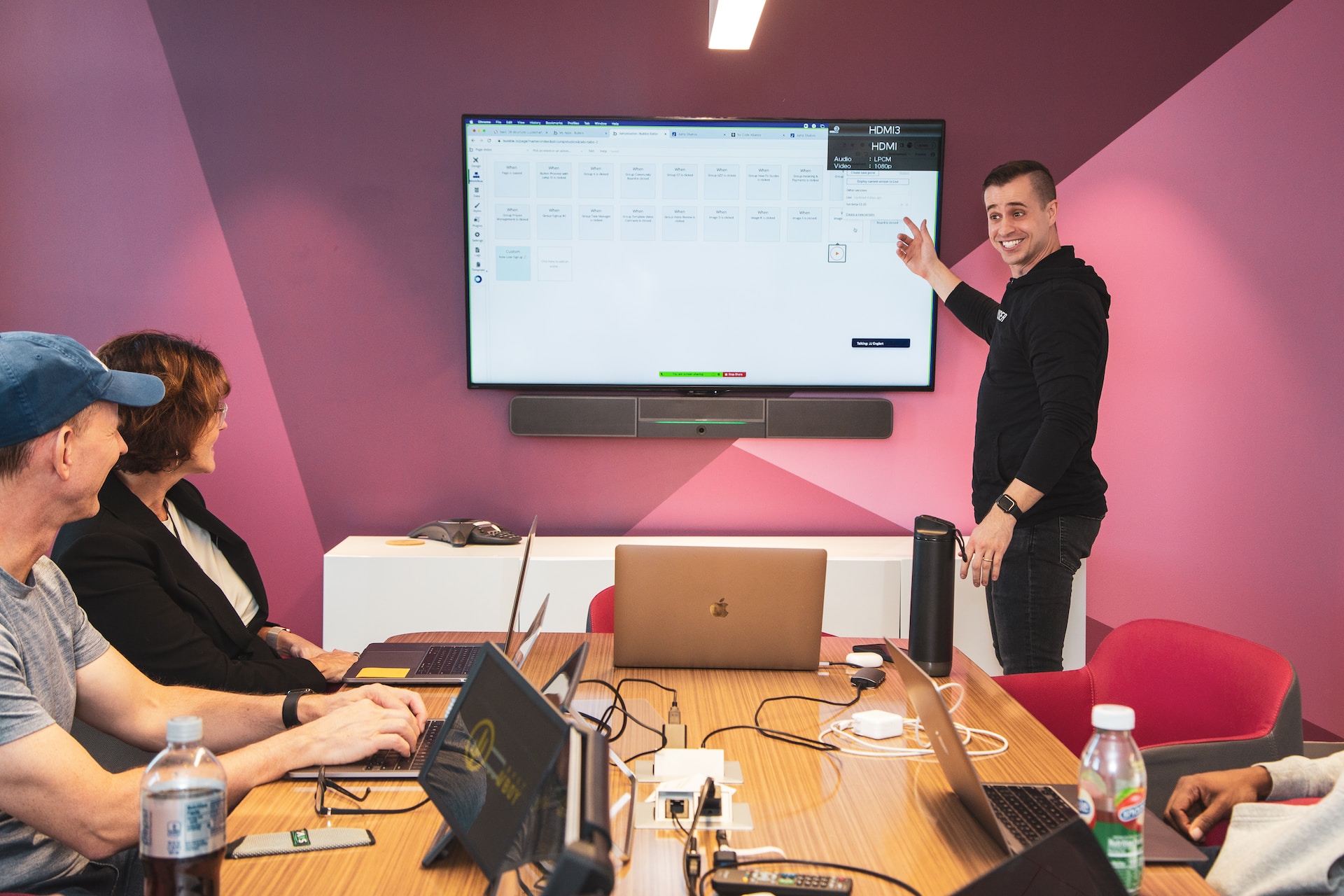How spending $100k on developers kickstarted JJ Englert's career as a professional no-code developer
JJ is a Bubble pro and familiar name in the community but until recently he was actually a filmmaker. In this interview he tells us how wasting huge amounts on developers ignited his passion for learning nocode.
In this interview JJ talks about:
- His life as a filmmaker
- Raising $270k and spending $100k on software engineers to build his dream app
- Discovering Bubble, then building and selling his first SaaS
- Leading dev teams vs product management vs teaching Bubble
- Working in a team vs alone
- When to use code and when to use no-code
- Predictions for the no-code space over the next few years
- Advice for folks wanting to become a pro Bubble developer
Who are you and what’s your backstory?
My name is JJ Englert. I am located in Rochester, New York, which is about five hours away from downtown Manhattan.
I’ve been a filmmaker since high school, went to college, film school, and spent 10 years in the film industry before discovering no code. I was a film producer and a director. I’m part of the Producers Guild of America. I’ve directed feature-length films that are on Netflix.
They are very small, independent films - I was never a Hollywood producer; I was a Hollywood indie producer trying to make ends meet shooting music videos with people like Major Lazer and Armin Van Buuren. I produced his video and some for other artists. Anyways, so I did a lot of that stuff. In around 2017 I was hiring like 300 filmmakers a year.

I wanted to make that process easier because I would go to other states, having lived in LA at the time, and I needed to find maybe 20 or 30 members for my film crew to do that video for that one day. It was really hard.
So I came up with the idea for my first tech startup, Industry Jump.
Industry Jump was a hiring platform for filmmakers where producers can go on and hire film crew for their productions. I had no idea about technology or what to do with it. This was my first foray into it. I had previously built WordPress websites and stuff like that, and I had a general understanding of UI/UX and building simple stuff.
But I wanted to build something real this time, like a scalable marketplace solution. At the time, I didn’t know about no-code, so I asked my friends, “How can I build this?”.
So you built Industry Jump with code?
One of my friends told me about an ex-Microsoft engineer in San Francisco who I could hire. So, I did. Initially, I was quoted around $70,000 for the MVP of a two-sided marketplace built on .NET and Angular, a complex code stack. I thought maybe I could scrape together this amount from friends and family, raise this, and once I build it for 70 grand, I wouldn’t need more money. It would be good.
However, halfway into building it, we were way behind schedule. We spent around $20k to get a sign-up page or a sign-in page, something crazy.
We quickly realized that I loved the process of working with designers and developers to create things, but I was going to run out of money. If I had thought of this from a business perspective, it would’ve been crazy, but I was operating under the promise that once I built it, everyone would come and give me money and they’ll make up for it.
I ended up raising money from friends and family. I also started raising money from angel investors in Los Angeles. In total, I ended up raising about $270,000. I also got into an accelerator in San Francisco, which gave us more money and equity to proceed there. We had a demo day there and everything.
Long story short, maybe a year later we launched our MVP, a very basic sign-in, sign-up, and profile creation page with reviews. Users could find others using a simple search and then message those people. We didn’t implement payments or anything like that. It took us about a year and probably $70,000 to $100,000 to get to that point.
We got some early traction from some non-technical influencers who helped spread the word, and we were able to quickly get a lot of users, but not many were actually using the platform.
Fast forward to a couple of years later. We tried everything we could, but we never really found product-market fit. We were never really able to make a lot of money from it or make enough money to cover the bills.
When did you discover Bubble and no-code?
Eventually, I ran out of money and I didn’t have any more money to pay my engineer. But I didn’t want to shut it down. I was still pretty stubborn and I was like, okay, I need to figure out how to do this myself if I’m going to keep this alive.
I didn’t think I was smart enough at the time. I didn’t think I could do it.
And I didn’t have a lot of time. I knew I could have spent like a year or two learning a whole stack.
Luckily that’s when I discovered Bubble through a Facebook advertisement. They were like, ‘Hey, build this entire thing in a scalable infrastructure.’ I didn’t think I was smart enough, but I still tried.
I took Gregory John’s Bubble course and just took it one lesson at a time and was quickly blown away. Creating a signup with a social login like Gmail literally takes a second. That was something that we could never do with Industry Jump because it would’ve been like 20 hours to integrate that OAuth and to go through it. And I didn’t want to pay a developer for 20 hours to do something like that. So we just never did it.
Once I started learning those things in Bubble, it was just kind of crazy. I hadn’t learned Bubble or coding beforehand. I was just a PM, and was just managing that stuff. This was my ‘aha’ moment.
I started rebuilding the platform, and building parts of the platform that I always wanted to build but couldn’t afford to, such as the project management side of it. Industry Jump was the hiring part, so I wanted to add a project management side.
That ended up being Jump Studios - it was the first SaaS product that I built with nocode. It was an asynchronous feedback platform. So, you upload your videos, you send off your feedback, your videos to your clients.
They would leave time-coded annotations on the video for like, you know, this is edit one, edit two, edit three, till you get to a final product. Then once you got to a final product, you would send them a presentation link, which was branded to your company. They could download those videos and have a lot of marks in the videos, etc.
It ended up getting several hundred users.
After about a year and a half of doing that, maybe two years, I ended up selling it. It was a small acquisition through MicroAcquire.

You teach no-code, lead dev teams, manage products, and build your own SaaS products. If you could choose only one of those to do for the rest of your career, which would it be and why?
This is really hard. I love teaching, but I don’t want to do it full-time. I love leading dev teams, but I also don’t want to do that full-time. I like my own SaaS, but it’s stressful as hell.
Honestly, I wish I could do all three. That’s kind of my current world where we do a little bit of freelance work, we build our own products and companies, and then we also teach, similar to maybe an AirDev.
But I also don’t want to do that quite yet.
So I guess for now, I’d say I’d teach, but then I’d go on to manage products after that.

Unlike many no-coders who go the solopreneur route, you’re frequently working with teams. What do you like about leading teams rather than working alone?
Not being alone is honestly one of my favorite parts about building a bubble. I’ve always been very communal.
That’s why I started my Bubble Slack group, because I wanted to build with people. I’m also the type of learner who builds and feeds off others, helps each other, and shares feedback about what I just learned.
They share their favorite things that they’ve just learned. I’ve found that I can learn faster that way.
So, I think building with teams allows you to create a learning environment where you’re always learning from each other and building the best way possible, and you’re never stagnant. That’s why I always want to be building with people and teams and why I’m so interactive with the community.
I get just as much benefit from it as I give back, or at least I try to give back as much as I get. I get a lot from the community, and they’ve really helped me over the years. I wouldn’t be where I am without them. I just love working with teams because it creates a learning environment that helps me learn faster.
What are your thoughts on using no-code over code for enterprise SaaS? Are there specific situations where you would opt for code over no-code, or rebuild with code?
Are there specific solutions where I would opt for code? Yes, of course. There’s a tool for every job, right? My first job as a professional no-code bubble developer was for building an SEO company. This company just needed a lot of data. It needed to create and retrieve a lot of data, and Bubble isn’t great with that.
It’s not a great tool for that type of backend. We always struggled with it. They actually transitioned off Bubble for that reason.
But my last company, a basic SaaS with some FinTech providers, Bubble was great for that. We didn’t have any real needs where we needed to create 10,000 data points right away.
It was just a simple CRM SaaS with basic project management, invoicing, and proposals. There wasn’t a huge need for high speeds or large scales. It worked perfectly for that.
So, it depends on where you’re at and what company you’re building, and what problems you’re solving. I always prefer to go no-code as much as you can.
If you start to see one of your functions is becoming too much of a burden on Bubble, then offload that one function over to Xano. But try to stay in Bubble as much as possible. We tried to go full backend with Xano and we just lost so much time.
One, we had to learn it. But then two, once we learned it, it still took us so much longer to build in Xano than in Bubble.
So building with Bubble really gives you the speed to build that is unmatched anywhere else, and you don’t want to lose that, especially as a solo entrepreneur.
Do you have any predictions for how the no-code space will evolve over the next few years?
I think we’ll continue to see a lot of new tools coming. I think we’ll continue to see tools that are decoupled from the frontend to the backend, like Webflow and Xano. I think stacks like that will continue to be popular.
Right now Bubble is kind of treading water, just because I think they have a lot of technical debt they need to get through. Compared to new platforms launching today that might have the latest tech stack, with the fresh and good stuff, Bubble has been around for 10 years and they’ve been using older stacks.
So, in terms of actually innovating, Bubble has kind of plateaued, but I think they are working through that, and they have a large team. They will get there and then they’ll be back on top.
So, this next year for Bubble is really big for many reasons. One, the pricing change. Everyone’s going to be moved over to the new pricing plan. So they really have a year to prove to their customers that it’s worth these additional costs and all these additional upgrades.
But then two, the market is busier than ever and is becoming friendlier to intermediate professionals because companies have started to see the value of working with professional no-coders. This professional enterprise market for no-code has matured. This has also allowed for Bubble to start focusing on that customer segment, along with these other tools.
To sum it up, I think we’ll always have a market for brand new no-code tools that are very simple, where you can just turn spreadsheets into whatever. I think that will be a market that will continue to grow and be highly beneficial in the coming years as big companies start to look towards automations, as they move away from Excel and get into things like Zapier, etc.
But then I think we’ll continue to see growing momentum in the professional no-code space with enterprise tools that will start to slowly replace a lot of enterprise tools that were built on code and are now being built on no-code. There’s just no need for it anymore. No-code can replace so much of the existing outdated infrastructure quickly and get them up to speed and to a place where they can manage their code base going forward.
So many companies have software built five years ago that they can’t do anything with. They can’t touch it; they can’t improve it. You want to get to a place where you can constantly iterate, right? Or log in and see what’s going on as a user and troubleshoot your own stuff. Bubble and others make that possible.
So, I think we’ll start to see a lot more no-code in the enterprise space. And I think we’ll all benefit from that.What advice would you give to others hoping to become a highly technical Bubble developer?
Be patient. It takes time. The first six months is you just getting to know things, starting to build things slowly.
But then from there, make sure you’re active in the community. You’re asking questions. You’re making the most of it because I think being a part of the community makes it more fun. You can learn from each other. I think that will help to set standards of what you need to do and where you need to be to be a really good Bubble developer.
By being active on Twitter and in my Slack group, I think it’ll help shape where you should go as a Bubble developer and help lay out that foundation. Take some of my courses and help provide that professional-level content of what is expected of professional Bubble developers.
I think six to twelve months of really going at it for 10 to 20 hours a week, and you’ll be ready to make some serious money as a Bubble developer. That’s really exciting.